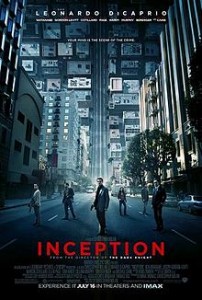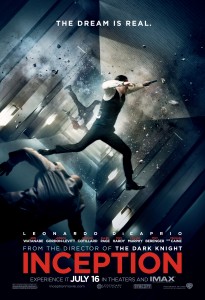Inception: A Kabbalistic Take on the Film (Part 1)
By Asher Crispe: December 18, 2012: Category Inspirations, Living with the Times
 The Hollywood dream factory has never had difficultly producing dreams. Putting a dream within a dream (within a dream…) is another story entirely. The orchestrated magnificence of Christopher Nolan’s 2010 blockbuster film Inception begs for philosophical analysis. Taking the dive into the heart of this elaborate ‘thought-experiment,’ we can expose all sorts of secrets from the mystical tradition of Kabbalah just by reflecting on some of the key points of this movie. At the same, time Jewish esotericism provides long burning matches that will guide our voyage through this nocturnal adventure, illuminating many of the core questions along the way.
The Hollywood dream factory has never had difficultly producing dreams. Putting a dream within a dream (within a dream…) is another story entirely. The orchestrated magnificence of Christopher Nolan’s 2010 blockbuster film Inception begs for philosophical analysis. Taking the dive into the heart of this elaborate ‘thought-experiment,’ we can expose all sorts of secrets from the mystical tradition of Kabbalah just by reflecting on some of the key points of this movie. At the same, time Jewish esotericism provides long burning matches that will guide our voyage through this nocturnal adventure, illuminating many of the core questions along the way.
First a quick recap: this is the story of Dom Cobb (played by Leonardo DiCaprio) who engages in a form of corporate espionage via some very unconventional tactics: he drops in on a person’s dreams in a Sci-Fi techno-future where sharing dreams are just a mix of chemicals and a few drips of an IV away. Normally, he and his accomplices aim to extract information from the unconscious mind that they enter into, but the challenge is different this time. Rather than unlock ‘classified information,’ Cobb has been hired to implant an idea in the mind of Robert Fischer (played by Cillian Murphy) who has just become heir to his recently deceased father’s corporate empire. The objective is to have him thinking that he should break up his energy conglomerate and thus make room for the major competitor who hired Cobb. The real challenge involves how one causes the ‘inception’ of an novel idea, particularly one as radical and conflicting as this.
To accomplish this, Cobb devises a scheme whereby an additional sedative will be used to go even deeper into Fischer’s unconscious. One level of dreaming is not enough. His mind has been trained to defend itself against such dream hacking. Two levels would be better, but Cobb decides to make the bold move and go in three levels–a dream within a dream within a dream. Amidst the confusion of multiple dream realities, the hope is that Fischer’s sense of what’s real (what comes from his own mind and what is suggested by his illegal dream companions) may get so confused that he buys into the idea which has been planted like a ‘seed’. Once it takes hold in his mind, Cobb believes it will continue to fester until it becomes almost impossible to uproot. We learn that in order to really convince him the idea must have an emotional charge to it, otherwise it may not be infectious. To this end, Cobb ties the notion of breaking up the company to a fictitious alternative Will from Fischer’s father that ‘suggests’ this plan. In the dream, the Will is locked away and opened when Fischer comes face-to-face with his father on his death bed. The overwhelming emotional tension between the father and son then sells the idea.
Like all ‘heist’ films, the plan never goes off without a hitch. In this case, Cobb’s own psychic stress bubbles up and he has to contend with the phantom of his past in the form of his unconscious projection of his dead wife. This adds another element of danger to the plot and ups the stakes of Cobb’s covert venture. At one point he (and some of his associates) fall still further down the rabbit hole. As if three levels of dreaming turning over upon themselves were not enough, they descend to a fourth level which is referred to in the film as ‘limbo.’
The peril of limbo has to do with the phenomenon of time dilation that occurs within a dream. Just as anyone who has awoken from an intense dream that seemed to last for hours, only to discover that only a few minutes of have gone by on the clock, knows dream time slows considerably. In the movie, each successive dream level stretches our sense of temporality so that by the time we are three dream levels in, seconds turn into hours, hours to days. At the bottom in limbo, a day in the waking world translates into half a century. With so much dream time on one’s hands, the danger is losing one’s mind. We might not remember what’s real, or worse, we might become convinced that the dream is what’s real. Escape from this ‘virtual’ reality can only happen with a ‘kick’ that causes one to wake up in the level of relative ‘reality’ above. Coordinating successive ‘kicks’ ultimately allows Cobb and his crew to escape back up the ladder of illusionary reality (or so we think…).
Now let’s add Kabbalah into the mix:
For starters, there are two different cognitive powers in the soul which function in tandem called the ‘father’ and ‘mother’ of the mind. ‘Chochmah’ or our first seminal flashes of ‘intuition’ and insight that seem to emerge from out of the dark clouds of the unconscious into the conscious mind denotes the ‘father’ figure. By contrast, ‘binah’ or ‘understanding’ reflects our capacity to develop and unpack that initial insight from ‘father’ by contextualizing it within our already existing set of concepts. Stated otherwise, the ‘fathering’ of a new idea would be an example of ‘inception.’ In fact, in Kabbalah chochmah (intuition) is ofter referred to as the ‘reishit’ or the ‘beginning’ of revelation. It is the ‘seeding of the mind’ with new ideas. ‘Mother,’ on the other hand moves around, recombines and synthesizes existing ideas. This quality of binah or ‘understanding’ has to work with something that pre-exists. It cannot conceive without outside input. Therefore, if wisdom relates to inception, understanding would be the equivalent of conception.
 As far as multiple dream levels are concerned, we can explain this in terms of the imagery of exile and redemption throughout Torah texts. For instance, in Psalms 126:1 we read “A song of ascents. When God will return the exiles of Zion, we will be like dreamers.” Reality means a redeemed world in which we have awoken to a true consciousness of Divinity and a perception of what happens behind the scenes of the world. We lose ourselves, fall into a spiritual unconsciousness that is likened to sleep. This state of exile gets redoubled throughout the course of time. We forget that we are sleeping and that this is a dream. We becomes asleep to the fact that we are asleep and we start to dream within the dream. If only we would know it’s a dream we could always try to wake up but instead we settle in and get comfortable in our virtual world and the dream threatens to become our reality. The biggest fear then is that we might stop trying to rouse ourselves.
As far as multiple dream levels are concerned, we can explain this in terms of the imagery of exile and redemption throughout Torah texts. For instance, in Psalms 126:1 we read “A song of ascents. When God will return the exiles of Zion, we will be like dreamers.” Reality means a redeemed world in which we have awoken to a true consciousness of Divinity and a perception of what happens behind the scenes of the world. We lose ourselves, fall into a spiritual unconsciousness that is likened to sleep. This state of exile gets redoubled throughout the course of time. We forget that we are sleeping and that this is a dream. We becomes asleep to the fact that we are asleep and we start to dream within the dream. If only we would know it’s a dream we could always try to wake up but instead we settle in and get comfortable in our virtual world and the dream threatens to become our reality. The biggest fear then is that we might stop trying to rouse ourselves.
Yet, this is not the end of the line. According to Kabbalah, we exist within a framework of four worlds, each of which causes us to fall further asleep and lose sight of the truth as we will continue to explain in Part Two.
http://www.interinclusion.org/inspirations/inception-a-kabbalistic-take-on-the-film-part-2/
Inception: A Kabbalistic Take on the Film (Part 1),























;)
;)
;)
;)
;)
;)
;)
;)
;)
;)
